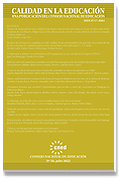Relación entre alta capacidad y variables socioafectivas: emergencia de necesidades educativas especiales
DOI:
https://doi.org/10.31619/caledu.n56.1173Palabras clave:
alta capacidad, inclusión educativa, necesidades educativas especiales, variables socioafectivasResumen
Desde las premisas de que para que la alta capacidad se exprese como desempeño sobresaliente requiere la atención de necesidades educativas y socioafectivas, de que estudiantes con alta capacidad tienen características particulares que les hacen vulnerables y que cuentan con necesidades particulares en tanto poseen alta capacidad como cualidad particular, este estudio busca identificar diferencias en características socioafectivas y actitudinales entre estudiantes identificados con y sin alta capacidad y, a partir de ello, proponer necesidades educativas especiales a ser atendidas. Se aplicó una batería de seis instrumentos a 371 estudiantes de cuarto básico a cuarto medio, provenientes de distintos tipos de establecimiento según su tipo de financiamiento y de distintas comunas de las regiones del Biobío y de Ñuble. Se analizaron estadísticos descriptivos, compararon medias y se estudió la correlación entre pruebas usando el programa estadístico SPSS, versión 22. Se encontraron diferencias significativas en variables actitudinales y socioafectivas entre ambos grupos, siendo posible proponer un conjunto de necesidades educativas especiales que requieren oportunidades educativas integrales. Este estudio releva la importancia de la formación integral y la atención a las necesidades socioafectivas para transformar el potencial intelectual en desempeño sobresaliente, y busca inspirar la creación de oportunidades educativas dirigidas a ello.
Descargas
Publicado
Número
Sección
Licencia
Derechos de autor 2022 Calidad en la Educación

Esta obra está bajo una licencia internacional Creative Commons Atribución 4.0.
Los autores conservan sus derechos de Copyright, sólo transfiere una parte de ellos a la revista aceptando los siguientes términos:
a.Los autores/as conservarán sus derechos de autor y garantizarán a la revista el derecho de primera publicación de su obra, el cual estará simultáneamente sujeto a la Licencia de reconocimiento de Creative Commons que permite a terceros compartir la obra siempre que se indique su autor y su primera publicación esta revista.
b. Los autores/as podrán adoptar otros acuerdos de licencia no exclusiva de distribución de la versión de la obra publicada (p. ej.: depositarla en un archivo telemático institucional o publicarla en un volumen monográfico) siempre que se indique la publicación inicial en esta revista.
c. Se permite y recomienda a los autores/as difundir su obra a través de Internet (p. ej.: en archivos telemáticos institucionales o en su página web) antes y durante el proceso de envío, lo cual puede producir intercambios interesantes y aumentar las citas de la obra publicada.
